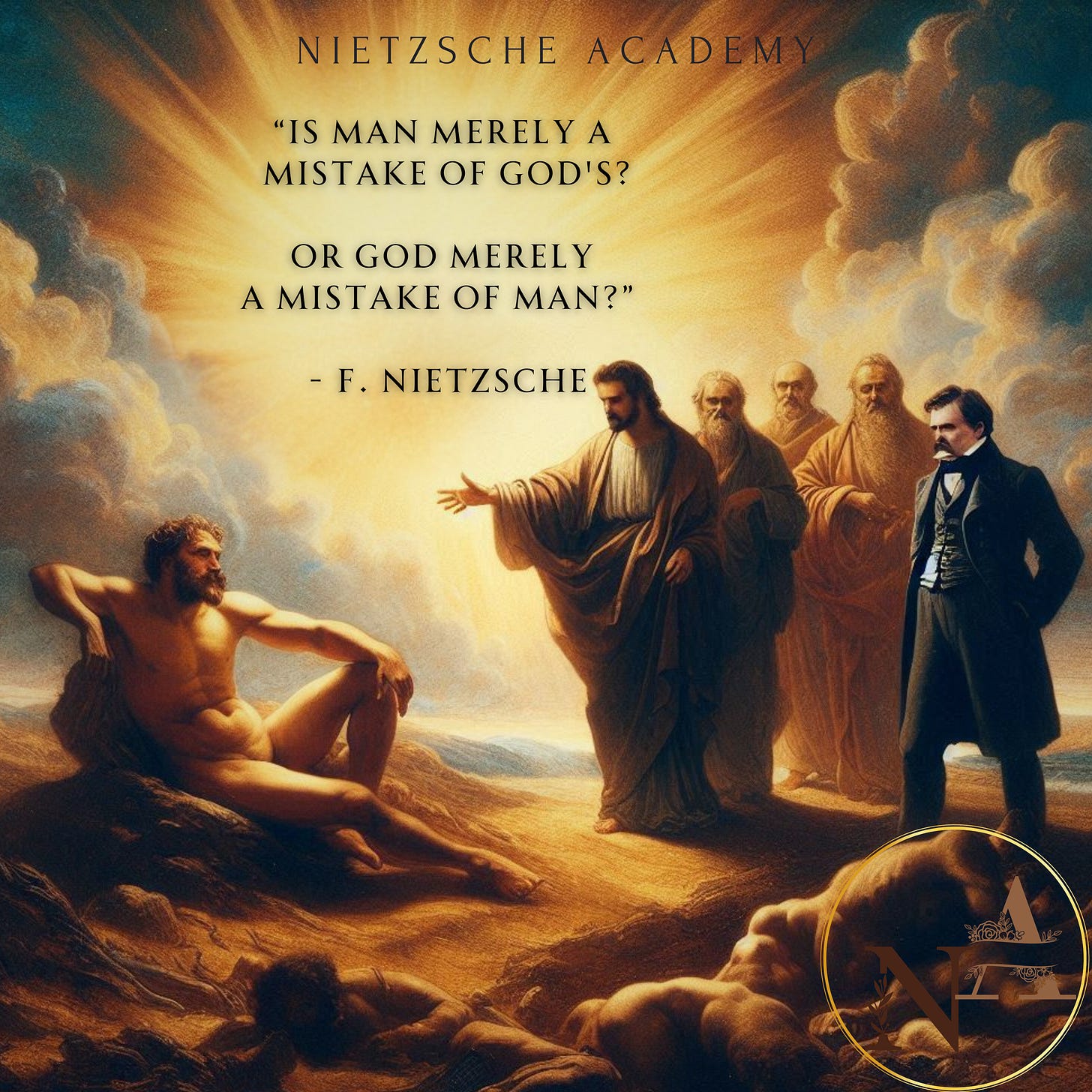THE TIME TO EMBRACE THE TRUE NATURE OF NIETZSCHE’S PHILOSOPHY HAS COME.
Until now we have only clarified what’s the difference between the First and Second Nature in Friedrich’s conception and shown how to do a personal analysis of the “tools & material” you have inherited.
If you missed any of these episodes, you can check them here:
1. Episode I.
2. Episode II.
3. Episode III.
(If you did, I recommend that you read these first as they’re written in sequential logical order).
If, however, you’re a loyal reader and you did your homework by “checking what you got” then you have earned the privilege to move to the real deal part of Self-Reinvention - the Reinvention itself.
The Self-Reinvention is the process of cultivating your Second Nature and will be explained over the next four episodes:
The Origin
The Process
The Avatar
The Transformation
Today we’ll explore the roots of the monumental tree we’re about to plant & grow…
The Origin - God is Dead
Before we jump in any of the transformational steps, it’s very important that we understand how this concept actually came into existence. The concept is old as humanity itself or at least as old as first attempts for deepening of our consciousness. Heroes like Achilles, Alexander the Great or much later in history - Napoleon - all used this concept long before Nietzsche even thought about it. It’s no coincidence that Nietzsche felt deep sympathy for all these successful figures.
Contrary to what one might expect, Nietzsche came to this powerful process rather slowly and gradually. Since his birth, Nietzsche was led by his Protestant father towards the path of Christianity. Friedrich was since his early childhood a very self-reflective, deep thinking and very rebellious kid. He loved to be challenged as well as to challenge others. It was an undeniable and very characteristic part of his first nature to take anything for granted - be it from teachers, parents, friends or a transcendental entity itself. The WHY’s and HOW’s were always on his mind.
God was no exception to him. As anything else it had to be verified and proven by reason, before the mind can seal it with “legit”.
Given Nietzsche’s open-minded, self-reliant nature and his father’s frequent prompting, God was on his mind almost 24/7. However, not as welcomed guest, much less as an undeniable authority. Rather he was in the position of a rat in a lab with Nietzsche trying to be the objective scientific judge.
Before the famous quote “God is dead” to which we’ll come back in a second, there was a long period of uncertainty. Nietzsche didn’t just all of a sudden woke up one day deciding that God is dead. He actually went back and forth numerous times, when questioning the true incentive in the life of a human being. In other words he was searching for the true “life maker” between God and human. This can be perfectly seen in the following thought of his:
“Is man merely a mistake of God's? Or God merely a mistake of man?”
- Friedrich Nietzsche
Nietzsche is very often mistakenly seen as the most arrogant thinker ever. He might have had some moments of arrogance later in his life when his physical as well as mental health deteriorated, but young Nietzsche, actually until his mid thirties was, sane, reasonable, and analytical - in one word - sharp. He was supremely confident, but not arrogant.
Arrogance is confidence without knowledge or competence. Arrogance is “I’m right and there is no discussion about that.” That wasn’t Nietzsche’s case. To him God’s role and origin was always an open debate as he loved to be challenged.
The first step - Self-acknowledgement
And so it happened that after years of unceasing brooding and debating with other teachers, philosopher even his short lived relationship partners he concluded that:
God is dead. God remains dead. And we have killed him.
- F. Nietzsche
Most people know and like to regurgitate only the first one of the three sentences. The whole quote can be found in his book The Gay Science in section 125 “The Madman”. It’s in the second and third sentence of this quote, however, that the seed of the Self-Reinvention concept lies hidden.
Nietzsche explains that “God is dead”, because we have killed him by being born. In his eyes we have replaced him. He insists that we don’t blame any external power not for the sake of being theologically right but for the sake of staying practical.
Care about what you can control and take the responsibility, regardless of whether luck or tragedy enters your life. It’s the concept of Amor Fati we discussed earlier. (That’s where Nietzsche and Stoicism overlap, although they don’t in many other areas).
The replacement of God by the sovereign individual (that’s YOU, me and everybody else who decides to take the ultimate responsibility for their life) is the core thought and at the same time the first step of the Self-Reinvention process as such.
IF you have the courage to be absolutely responsible for all your highs and lows in your life…
IF you have the audacity to question and challenge whatever is someone trying to force upon you or convince you about…
IF you have the guts to set your own goals, mission and overarching purpose of your life…
YOU BECAME YOUR OWN GOD.
The burden and privilege of Self-acknowledgement lies in the fact that you overtook the god-like procreative power, simply by the decision to take the responsibility.
Taking responsibility means:
You don’t blame anything on god, coincidence or a bad will.
You assume and acknowledge that these might be in play and take the responsibility regardless.
Why? Because whether the externals are in play or not is something you can’t never know for certain.
Speaking about becoming your own god, the christian one is said to have created this whole world in just seven days, all while taking the last day OFF! (Musk pales in his Tesla headquarters rethinking his productivity system)
We’ll be a bit more generous with ourselves and give ourselves the rest of our biological life to create our own New Self.
Welcome to the process of Self-Reinvention!
The greatest Task of your Life has just begun.
Thank you for reading!
Next time we’ll look at the various stages and requirements of the Self-Reinvention process itself.
Stay tuned!
See you soon,
fellow thinkers!



